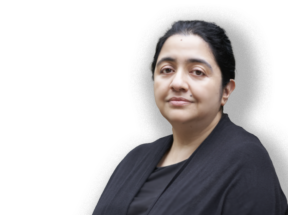One of the first ethnic minority muslim woman judges, Maryam Syed worked right up to the day she gave birth to her first child. Things must change for women in the profession, she says:
It had been a long day full of prison conferences with Barry George, the man who was to be convicted, then years later acquitted, of the murder of BBC TV presenter Jill Dando. I had been instructed to defend him before he was arrested. I was driving back from the station with my leader Michael Mansfield QC, we were discussing our conference when he suddenly changed subject, saying: “you should apply to be a judge you know, you would be really good at it.” I replied that I was just under ten years call it was a bit early, “You will be one in ten years, I know it,” he replied.
Well, just under ten years later I was standing in court one at the Old Bailey – where I had spent several months with Michael defending Barry George – and was duly sworn in as a Crown Court Recorder.
Profession Moving On
Last month Lord Neuberger spoke about diversity and female representation in the judiciary. Increasing diversity in our legal system is not just a matter for the judiciary but affects a range of chambers and firms – from regional high street practices to multi-national City and commercial firms who are struggling with gender imbalances, particularly at senior partner level. It is imperative if we are to improve the public’s confidence in our justice system, and show that the legal profession as a whole has moved on from the days of the predominantly white male elite network that appeared inaccessible. This is particularly important now when the proposed changes to legal aid are such that the smaller high street firms where women have traditionally flourished are so under threat.
There is diversity training but working patterns and culture needs to be addressed. There needs to be better use and, in some cases the creation of role model networks and flexible working. Women are still too often described as ‘difficult’ rather than ‘robust’; this must change.
I am acutely aware that I am one of a number of slowly increasing female members of the judiciary. I am even more aware that I am rarer still – not only a woman but an ethnic minority woman. Asked by members of the press whether I was the first Muslim woman Crown Court judge, I said I may not be. And the Judicial Secretariat said they could not confirm, as they do not keep those records.
There are simply not enough women or minority judges, although it is getting better.
It should only be an assessment on merit, but that means that the wider issue is that women should have the same opportunities to compete and be seen on the legal stage doing all types of work particularly at the most serious and complex levels and compete on pay and status.
Maternity Break
Then there is maternity. If you are a busy solicitor or barrister when can you take that career break for however long and return to the same level of work?
I perhaps insanely worked up to and past my due dates – for my first child travelling up each day from South London to Luton with swollen feet – only leaving once my client was on day three of his evidence (I texted my QC from the delivery suite: “Sorry you will have to get on with it I am busy now”).
The jury hung themselves so when I returned from maternity leave seven months later I went straight into the retrial following which our client was acquitted.
There is still in some quarters the hard wired thinking that women are best or better at the maternal areas – family law, sexual and child offences – and that in certain areas, particularly numbers, people would rather deal with men.
I ensure I do all areas of crime and family. I am a rape and child abuse specialist but I equally deal with complex organised crime frauds drugs and murder.
There has been a steady but slow change in the increasing face of legal female representation. My role models when I started were Helena Kennedy and Linda Dobbs. Then came solicitors Gareth Pierce and Louise Christian. Kate Thirlwall, my former head of chambers, is now a High Court judge.
I remember clearly from whispering quarters astonishment that a murder case as high profile as Jill Dando was being defended by a young female solicitor and barrister, both of whom were BME.
Like never before must we ensure that talent whatever its colour or gender is allowed to rise forth and attain those senior positions without preconception or pigeonholing.
This article was first published by Solicitors Journal and is reproduced by kind permission.
For help or advice please call +44 (0)20 7242 3555 or complete the form below
A member of the Clerking team will help you resolve your request.
Frequently asked questions
Do you have an out of hours number?
Yes, please call Chambers mainline number +44 (0)20 7242 3555 and you will be directed to the out of hours phone lines.
How can I find out whether 7BR can take my case?
As a direct access client, please visit our direct access page and complete the initial form, a member of the clerking team will then be in touch to discuss the next steps.
Will my barrister deal with all the correspondence?
Some barristers have the ability to “conduct litigation” for direct access clients. Our clerks will be able to assist you as to which of our members are trained and accredited to do so.
How do I instruct a barrister?
Please visit our direct access page for the initial steps on instructing a barrister, or contact our clerks on +44 (0)20 7242 3555.



